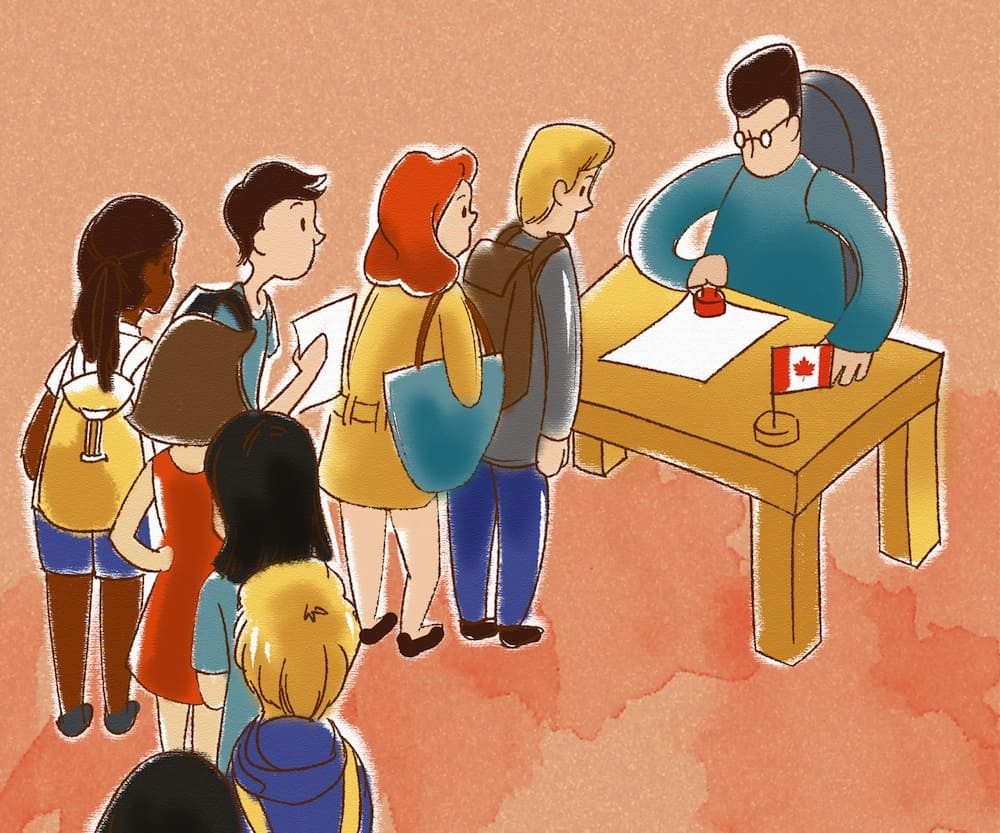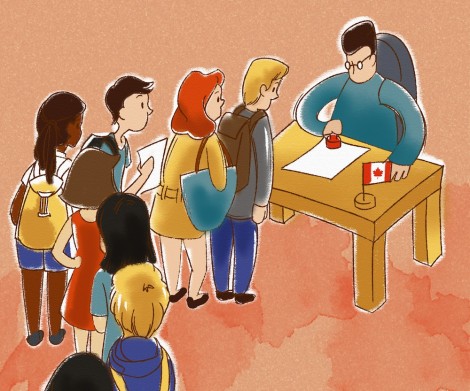The Professional Association of Foreign Service Officers (PAFSO) continues to be embroiled in a legal strike position that began on April 2, 2013. PAFSO is the union that represents foreign service workers employed by Citizenship and Immigration Canada (CIC) and the Department of Foreign Affairs, Trade, and Development. These professionals include the employees of Canadian embassies around the world who manage and process visa applications — including those of international students.
Fortunately, though perhaps unexpectedly, the dispute does not seem to have resulted in any significant decline in the distribution of student visas. Sonia Lessage, spokesperson for the CIC, explains that the number of student visa applications has increased by six per cent since last year, but 12 per cent more have been issued, resulting in a 79 per cent approval rate, which is higher than the previous year’s. Richard Levin, the University of Toronto’s registrar says that the university has “been communicating with new international students over the past months and monitoring students’ visa progress and inquiries. Based on this we are cautiously optimistic that there won’t be a large impact on incoming students. However, since students register online, it will be impossible to know for certain for at least a few more weeks.”
This does not mean that the strike has not caused problems for international students. Aisha Hassan, an international student from Singapore, had to transfer her student visa to a new passport this year. Students are advised to begin this process at least a month before the old passport expires, and Hassan did so two months prior. “Mine expired in August, but I applied for the transfer [in] early June I guess, but I didn’t get it until mid-August, which is pretty last-minute, when you think about it,” explained Hassan, “Usually the most I think for a study permit would be not even eight weeks; it’s very unlikely it would be eight weeks, but yeah, mine took a lot longer than expected. I was actually scared I wouldn’t get it on time.”
“I would think that the students most affected would be the new students just coming into Canada, because it’s a much longer process. Depending on where you’re from, you have to do medical exams and get acceptance letters, and that takes more than two months, I would say,” she concluded.
U of T’s Centre for International Experience (CIE) made note of the unusual difficulties international students may have had this year in securing their visas. Throughout the summer, the CIE filled their newsletters with messages warning students that CIC workers were on strike and that delays in the processing of applications should be expected until the resolution of the dispute.
Lesage acknowledged the possible inconvenience, and encouraged students to submit their visa applications as soon as they could, rather than waiting until the department’s deadline, to best ensure that they could be processed in time. “Those who had their applications in on time, those who had all the necessary documentation or whose applications are complete, are overwhelmingly seeing their applications processed,” said Citizenship and Immigration Minister Chris Alexander, “There are probably some that came in later than we would have liked to see who may experience some disruption, but that actually happens every year. I think we’ve seen a remarkable response to an unprecedented demand for the Canadian educational system.”
While CIC’s success at continuing to process and distribute visas is perhaps a relief to some students, it raises the question as to how exactly the department is continuing to perform this service if all the professionals who are supposed to do it are on strike. Lesage was vague in her explanation, saying only that “All visa offices remain open and continue to provide service to clients. Every visa office maintains a core number of staff that have been deemed ‘essential.’ Over 1,000 locally-engaged staff continue to work in the visas [sic] offices overseas. Moreover, CIC is requesting that essential staff work overtime where possible.” These 1,000 so-called “essential” employees who are providing services to clients and keeping CIC’s visa offices open, are almost certainly not members of PAFSO.
Chiefly at issue in this dispute is what PAFSO terms a $14,000 “wage gap” between the salaries of foreign service workers and other, similarly qualified federal employees who do similar work — such as economists, commerce officers, and policy analysts. “There is no valid reason why FSOs [Foreign Service Officers] should not be paid exactly the same,” said PAFSO spokesperson Chrystiane Roy, adding: “Equal work should result in equal pay.”
There appears to be no end in sight to the strike, as PAFSO and the Treasury Board have not engaged in meaningful negotiations since January of this year. The most recent attempt to end the strike was in July, when the union proposed to enter into arbitration to settle the dispute. However, nothing came of this proposal as Tony Clement, president of the Treasury Board, refused to enter the process unless six preconditions he submitted were imposed upon it. Clement could not be reached for comment for this story.
As a result, PAFSO have filed a claim of bad-faith bargaining against the Government of Canada with the Public Service Labour Relations Board (PSLRB); on the grounds that the Treasury Board has “knowingly and intentionally demanded conditions for binding arbitration that could not reasonably be accepted.” PAFSO president Tim Edwards stated that “We can only conclude that Treasury Board is acting with prejudicial intent toward Canada’s Foreign Service — behaviour that should be of serious concern to all Canadians. We are seeking judicial intervention to compel the government to negotiate in good faith.” The labour withdrawal continues as the parties await the pslrb’s ruling. “Ideally, this ruling would include a punitive measure for the government which would force them into arbitration. If such a scenario were to unfold, the strike would not immediately be over, but as a gesture of good-faith, PAFO members would return to work and suspend all job withdrawals,” explained Roy from Ottawa.
For students, the PAFSO strike practically seems to have caused, at most, a limited problem. Visas, while sometimes delayed, are not being withheld with any significant regularity, and in fact seem to be getting processed more efficiently than ever. However, the government of Canada faces claims from a union of its employees that it is refusing to reasonably and fairly bargain with them, and continues to somehow maintain enough staff to do those employees’ work in their absence. “PAFSO has done everything in its power to resolve the issue. The government has done exactly the opposite,” Roy concluded, “Canadians should be shocked that in order to spare $4.2 million over the course of 3 years of our contract, the Government is willing to inflict serious loss to Canada’s economy and reputation abroad.”



